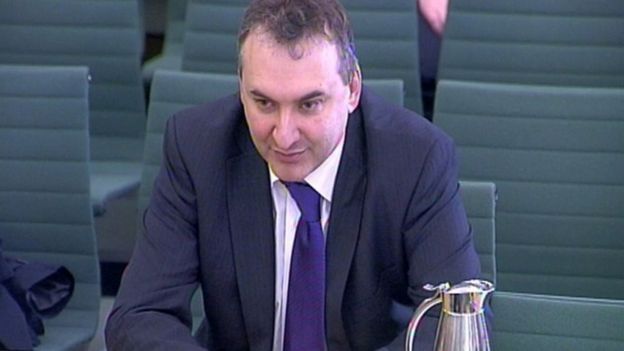Proof of ID may be needed for NHS care, says health chief
- 3Patients may have to show two forms of identification to get some NHS care, the senior civil servant at the Department of Health has said.
Chris Wormald told a Commons committee it was a controversial move but already happened in some NHS trusts.
The NHS has "a lot further to go" in reclaiming money for treating foreign visitors, he said.
Committee chairwoman Meg Hillier raised concerns that some British residents might not have passports or other ID.
Head of the BMA council Dr Mark Porter said the discussions were a distraction given that so-called health tourism was "such a small problem" for the NHS.
NHS Trusts in England are legally obliged to check whether patients are eligible for free non-emergency NHS treatment and to recover any costs from overseas patients.
But this does not always happen.
In numbers: Treating overseas visitors
The government estimates £2bn a year is spent on treating overseas visitors - and only about £280m of this is thought to be deliberate health tourism whereby people come from abroad specifically to get free treatment they are not entitled to.
The figure includes the cost of GP care, emergency treatment and routine hospital services, such as scans, maternity care and non-emergency operations.
The government has focused on recouping money on routine hospital care. It set a target of recovering £500m a year by 2017-18, but is behind schedule.
In 2014-15, when it set the goal, the NHS recovered just £97m.
A year later that had increased to £289m, but most of that - £164m - came from the introduction of health surcharge on visa applications of £150 for students and £200 for other people. This entitles them to free NHS care.
However, hospitals have struggled to significantly increase the amount they recover from patients they should be charging.
UK residents and asylum seekers are entitled to free treatment. But the governments of patients from within the European Economic Area should be charged for the treatment they receive, while visitors from outside that area should be charged personally if they have not paid the surcharge.
St George's Hospital in Tooting, south London, is currently running a pilot scheme to test new proof-of-ID processes to recoup costs from pregnant overseas patients.
'Big difference'
Mr Wormald, permanent secretary at the Department of Health, which is responsible for the NHS in England, told the Public Accounts Committee: "We have some trusts that are looking at asking for two forms of ID before treatment.
"Now that is obviously quite a controversial thing to do but... those are the kinds of things we want to look at.
 PA
PA
"We don't have evaluated results of those yet, but what those trusts are reporting is that does lead to an increase in identification."
He added: "There are individual trusts like Peterborough who are doing that, who are reporting that it makes a big difference and there you are saying, 'Please come with two forms of identity, your passport and your address,' and they use that to check whether people are eligible or not.
"Now it is obviously quite a controversial thing to do to say to the entire population, 'You now have to prove identity.'"
But Ms Hillier said she had constituents who had no photo ID.
She said: "Because they have never travelled, they have no passport; they have no driver's licence because they have never driven, they still live at home because they can't afford to move out so they've never had a utility bill in their name.
"Perfectly entitled to health care, British born, British resident; how are you going to make sure that people have access easily to the National Health Service without having to go through a very humiliating and impossible-to-meet set of demands?"
Mr Wormald responded: "This is why we are going very slowly on some of these questions and individual trusts are trying these out."
Dr Porter told BBC Radio 4's Today programme: "Why are we discussing this today? We've got an Autumn Statement tomorrow, we've got an NHS with a deficit opening up over the course of this Parliament because of the funding decisions taken about how to address resources in the NHS.
"This is little other than a pinprick on the top of the actual problems facing the NHS."
A Department of Health spokesman said: "The NHS is a national - not an international - health service and we are determined to stamp out abuse of the system to ensure it remains free at the point of need in this country.
"We consulted earlier this year on extending the charging of migrants and visitors using the NHS. We will set out further steps in due course."

No comments:
Post a Comment